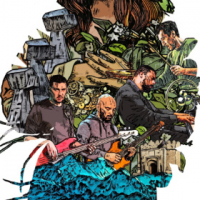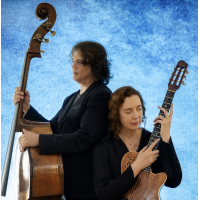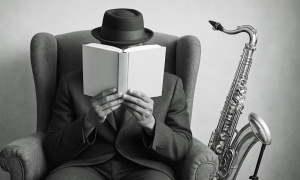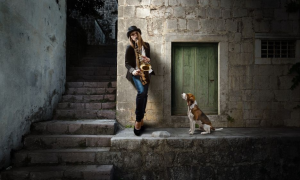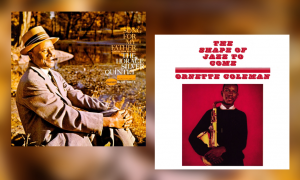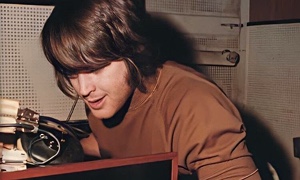Home » Jazz Articles » Building a Jazz Library » Rahsaan Roland Kirk: An Alternative Top Ten Albums Guara...
Rahsaan Roland Kirk: An Alternative Top Ten Albums Guaranteed To Bend Your Head

Courtesy Ray Ross
I didn't ask my mother to buy me a trumpet or a violin, I started right on the water hose.
—Rahsaan Roland Kirk
The wonder is that Kirk communicated so much of this visceral, deep-cleaning magic on disc too. Between 1957 and 1977, the year he passed, he created a catalogue of work which continues to transport listeners and inspire musicians. Most people's Essential Roland Kirk Albums lists will likely include some if not most of the following: Kirk's Work (Prestige, 1961), We Free Kings (Mercury, 1961), Domino (Mercury, 1962), I Talk With The Spirits (Limelight, 1964), Rip, Rig & Panic (Limelight, 1965), the aforementioned Here Comes The Whistleman, The Inflated Tear (Atlantic, 1967), Volunteered Slavery (Atlantic, 1969), Blacknuss (Atlantic, 1972) and Compliments Of The Mysterious Phantom (Hyena, recorded 1974, released 2003).
The Alternative Top Ten below includes some of Kirk's less widely celebrated but still outstanding albums. It also includes some of the discs he made as a sideman. Kirk was not often invited to guest on other bandleaders' sessions because he was such a giant presence that he tended to dominate proceedings whether he intended to or not. But Charles Mingus, Roy Haynes, Tubby Hayes and Jaki Byard were among the few who were not scared to have Kirk in their lineups, and the resulting albums enhance both their and Kirk's discographies.
Hopefully, you will find one or two items here that have so far escaped your attention.
 Roland Kirk
Roland KirkTriple Threat
King, 1957
Kirk's discography starts with this 1956 recording on which, though still only 20 years old, he emerges as a near fully fledged musician, composer and studio Jedi. He plays tenor saxophone, stritch and manzello, sometimes all three of them together, and four of the tracks are originals. The standards include Harold Arlen's "Stormy Weather" and Hoagy Carmichael's "The Nearness Of You," on both of which Kirk enriches the sound with overdubs (he was an early adopter of overdubs and electronic effects). All this was too much for an uptight jazz establishment, which either ignored the album or dismissed Kirk as a burleseque novelty act. But King Records, who also launched the career of James Brown, knew better. Kirk did not return to the studios for another four years, when he recorded Introducing Roland Kirk in Chicago for Chess, another pioneering black music label.
 Tubby Hayes And The All Stars
Tubby Hayes And The All StarsReturn Visit!
Fontana, 1963
Saxophonist, flautist and vibraphonist Tubby Hayes was that rare thing among the first generation of British hard boppers—a musician who was taken seriously by the hippest American musicians and audiences. He visited New York in 1961 for a well-received engagement at the Half Note and among several subsequent US visits returned to the Half Note in 1962, when this album was recorded. Kirk—who in turn was a regular visitor to the London club run by Hayes' mentor, Ronnie Scott—is one of three featured horn players (the third is James Moody, who appears under the pseudonym Jimmy Gloomy), accompanied by Walter Bishop, Jr. on piano, Sam Jones on bass and Louis Hayes on drums. Kirk is heard on tenor, manzello, flute and nose flute and the set list includes his "I See With My Third 'I'" and "Lady L." A cracking album.
 Charles Mingus
Charles Mingus Oh Yeah
Atlantic, 1962
An undervalued gem in the discographies of both Kirk and Charles Mingus, Oh Yeah is a down home Mingus tour de force given a dusting of off-planet magic by Kirk's presence (and by Mingus' vocal on "Passions Of A Man"). Kirk, who is heard on flute, siren, manzello, tenor and stritch, is one of two reed players. The other is tenorist Booker Ervin. But Ervin solos on two tracks only, while Kirk, who is prominently featured, does so on five. The all-Mingus material includes future favourites "Hog Callin' Blues," "Wham Bam Thank You Ma'am," "Oh Lord Don't Let Them Drop That Atomic Bomb On Me" and "Eat That Chicken." Oh Yeah is one of three Mingus albums featuring Kirk and it is the best of them.
 Roy Haynes Quartet
Roy Haynes Quartet Out Of The Afternoon
Impulse!, 1962
A larger than life personality of Kirkian proportions, Charles Mingus was able to retain his own aesthetic on Oh Yeah despite Kirk's presence. Roy Haynes, though a master of his art, is a more self-effacing figure and Kirk is the focus of attention during much of Out Of The Afternoon. By the time the album came out, most jazz critics had accepted that Kirk was an artist of real and lofty substance and Stanley Dance rather breathlessly described him as "the musical phenomenon of our time." The opening track, Artie Shaw's "Moon Ray," kicks things off in dramatic style, with Kirk soloing on tenor saxophone and manzello. Other standouts include Bart Howard's giddy waltz "Fly Me To The Moon," again featuring tenor and manzello, and Haynes' original, "Snap Crackle," on which Kirk adds the stritch and plays a forty-eight bar solo on nose flute and vocalized standard flute. Magic.
 Roland Kirk & John Cage
Roland Kirk & John Cage Sound??
Etorfilms, filmed 1967, released 2004
Here is a strange one. Sound?? is a DVD of a documentary made by the avant-garde British film director Dick Fontaine during visits Kirk and the downtown New York composer John Cage made to London in 1967. Kirk was playing a residency at Ronnie Scott's Jazz Club, Cage was working on a dance production at the Saville Theatre with the choreographer Merce Cunningham. Kirk and Cage do not actually meet in the film but were aware that their contributions would be cut up and spliced together by Fontaine. Kirk is shown walking down what looks like north London's Primrose Hill and working the crowd at Scott's accompanied by a band of London's finest, including drummer Phil Seamen. Cage is filmed in the back of a taxi making gnomic observations about the nature of sound. Audio quality is no more than adequate, particularly on the Kirk footage, but as an investigation, albeit an oblique one, into the meaning and function of music, the film stands the test of time. Sound?? takes up about half the playing time, with a Fontaine documentary on Ornette Coleman taking up the other half.
 Roland Kirk
Roland Kirk Now Please Don't You Cry, Beautiful Edith
Verve, 1967
The only album Kirk recorded for Verve, Now Please Don't You Cry, Beautiful Edith was titled with his wife in mind. It was produced by Creed Taylor, though "produced by" is probably an overstatement. Reflecting on John Coltrane's Africa/Brass (Impulse!, 1961), which Taylor supervised in the five minutes he stayed at Impulse! before crossing Broadway to head up Verve, Taylor said: "You don't produce John Coltrane. I just made sure he and Rudy [Van Gelder] had what they needed." The same was probably true with Kirk, though Taylor's touch can perhaps be detected on the album's easy-grooving flute closer, Billy Taylor's "It's A Grand Night For Swinging." A quartet album, with Lonnie Liston Smith on piano, Ronnie Boykins on bass and Grady Tate on drums, Kirk is listed as playing tenor saxophone, flute, stritch and manzello—but if you think it sounds like he is playing clarinet on the opening, Duke Ellingtonian "Blue Rol," you are not alone. Kirk also adds some wonderfully Ben Websterish tenor to the track. A lovely album from start to finish, with an all too short reading of Burt Bacharach's "Alfie."
 The Jaki Byard Experience
The Jaki Byard Experience The Jaki Byard Experience
Prestige, 1969
The title is almost certainly intended as an allusion to Jimi Hendrix's band because, although the production lacks the guitarist's plugged-in psychedelics, the music is in its own way just as mind bending; and, while Hendrix's rock was rooted in blues roots, Byard's and Kirk's jazz embraced far earlier forms than bop and hard bop. Kirk, the only horn present, adds to the historical ambiance with frequent use of New Orleans and swing era-referencing clarinet. "Shine On" is a traditional blues which was first recorded in the 1920s and Eubie Blake's "Memories Of You" is of similar vintage. There are two bop classics, Bud Powell's "Parisian Thoroughfare" and Thelonious Monk's "Evidence." Kirk and Byard had played together in Mingus' band and Byard was the pianist on Kirk's Rip, Rig & Panic (Limelight, 1965), and their exuberant styles complement each other perfectly.
 Rahsaan Roland Kirk
Rahsaan Roland Kirk Natural Black Inventions: Root Strata
Atlantic, 1971
Instrumentally, Kirk pushed the boat even further out than usual on Natural Black Inventions: Root Strata. In addition to the by now familiar tenor saxophone, manzello, stritch and flute, he plays Bb clarinet, Eb clarinet, pipes, harmonium, piccolo, bass drums, thundersheet, cymbals, bells, music box, palms, timpani, gong and bird sounds. He rarely needed other musicians behind him and this time he absolutely did not. But he added two percussionists anyway: Maurice McKinley on kit drums and Joe Habao Texidor on washboard, triangle, thundersheet and tambourine. There are thirteen tracks, twelve of them originals, and side one kicks off with manzello-led, Maghrebi tinged "Something For Trane That Trane Could Have Said," a trance number reminiscent of Moroccan gnawa music and a track which sits comfortably alongside the title track from Coltrane's Olé (Atlantic, 1961). The sole cover is a tender flute-led version of Duke Ellington and Billy Strayhorn's "Day Dream." The reason the album is not better known may be because the average track playing time of around three minutes allows relatively little soloing. But the tunes, and the textural inventions Kirk brings to the performances, are fine as the vine.
 Rahsaan Roland Kirk & Al Hibbler
Rahsaan Roland Kirk & Al Hibbler A Meeting Of The Times
Atlantic, 1972
A memorable meeting of eccentrics, Kirk's singularity is well matched by singer Al Hibbler's idiosyncratic phrasing and delivery. The album is a tribute to Duke Ellington, one of Kirk's heroes, whose material he often covered, and with whom Hibbler had sung in the 1940s. Kirk plays a respectfully supportive role throughout on tenor and baritone saxophones, flute and clarinet, mostly putting aside multi-horn pyrotechnics to play just one horn at a time. The quintet is completed by pianist Hank Jones, bassist Ron Carter and drummer Oliver Jackson. On the final track, Hibbler and company are replaced by Leon Thomas, Lonnie Liston Smith, Major Holley and Charles Crosby on the Kirk original "Dream," recorded at the sessions for Here Comes The Whistleman.
 Rahsaan Roland Kirk
Rahsaan Roland KirkReturn Of The 5000 Lb. Man
Warner Bros, 1976
In 1975, Kirk suffered a stroke which led to partial paralysis. On recovery, he recorded a final trilogy of albums for Warner Bros., before he succumbed to a second stroke at the end of 1977, aged just 42 years. Kirk continued to tour and play with vigour until the end, though stroke-related mobility issues allowed him to play "only" two instruments simultaneously. This superb album includes sterling performances of Ben Bernie's "Sweet Georgia Brown," Charles Mingus' "Goodbye Pork Pie Hat," Sammy Fain's "I'll Be Seeing You," Mack Gordon's "There Will Never Be Another You" and John Coltrane's "Giant Steps." The set list and liner notes suggest that Kirk may have known he was living on borrowed time, but you would never guess it from the music. Magnificent.
Tags
PREVIOUS / NEXT
Support All About Jazz
 All About Jazz has been a pillar of jazz since 1995, championing it as an art form and, more importantly, supporting the musicians who make it. Our enduring commitment has made "AAJ" one of the most culturally important websites of its kind, read by hundreds of thousands of fans, musicians and industry figures every month.
All About Jazz has been a pillar of jazz since 1995, championing it as an art form and, more importantly, supporting the musicians who make it. Our enduring commitment has made "AAJ" one of the most culturally important websites of its kind, read by hundreds of thousands of fans, musicians and industry figures every month.



